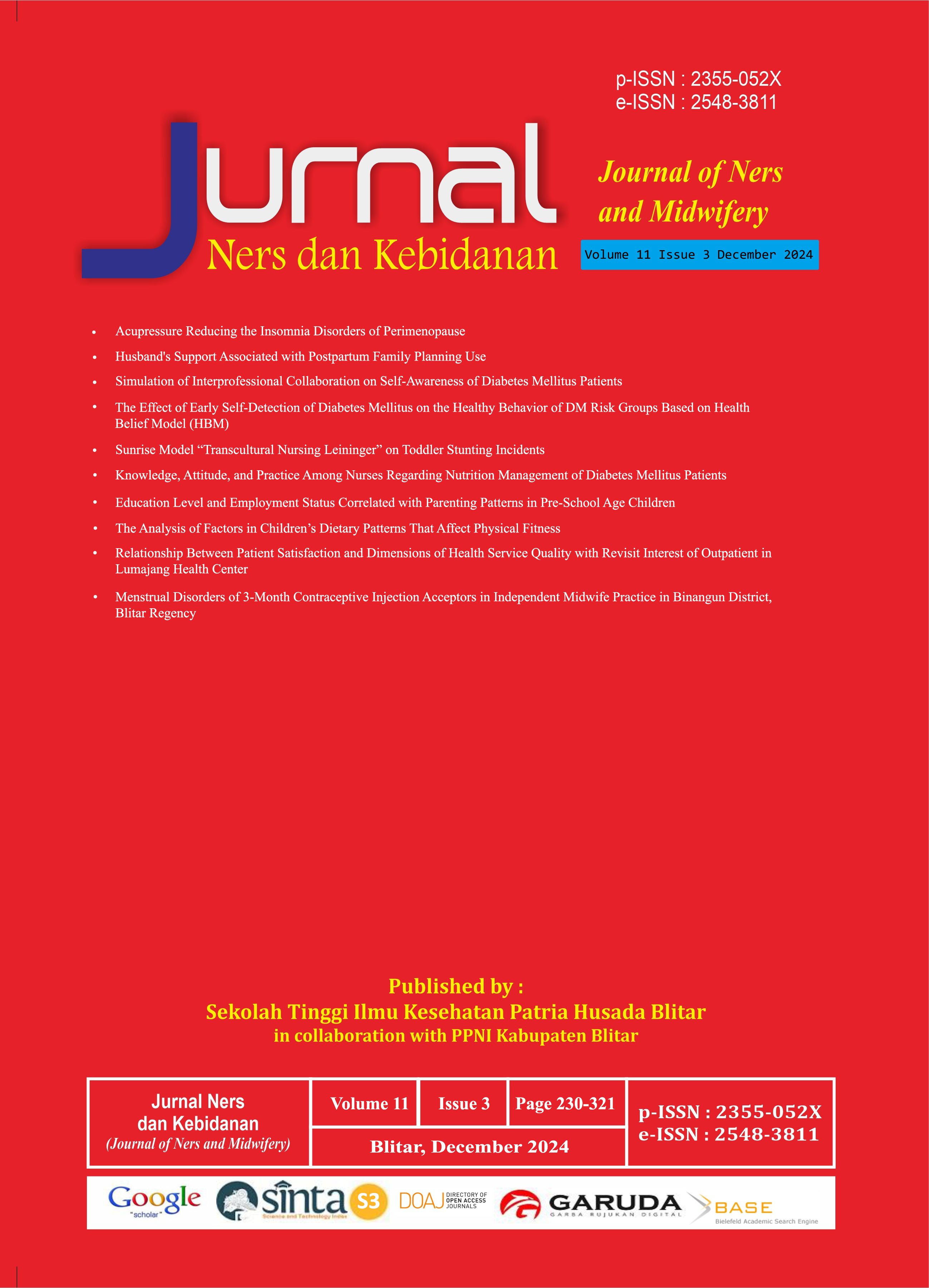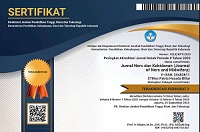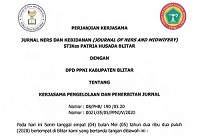Husband's Support Associated with Postpartum Family Planning Use
DOI:
https://doi.org/10.26699/jnk.v11i3.ART.p237-243Keywords:
Family Planning, Postpartum Contraception, Husband's Support, Mother's KnowledgeAbstract
Postpartum contraception prevents about 30% of maternal deaths and 10% of infant deaths within two years. As many as 62% of women who gave birth did not use contraception immediately after delivery. Therefore, this study aimed to analyze the correlation between maternal knowledge and husband's support for postpartum family planning use. This study was a cross-sectional study. The data was collected by interview and filling out questionnaires. The sample included mothers with no history of chronic and infectious diseases who were 42 days postpartum. Bivariate analysis was performed using chi-squared to evaluate the correlation between independent variables and dependent variables. A total of 42 women who gave birth were identified in this study, 21.4% were using postpartum family planning and 78.6% were not using postpartum family planning. Factors associated with postpartum family planning use were husband's support (p=0.038), while maternal knowledge was not associated with postpartum family planning use (p=0.480). Husband's support is associated with postpartum family planning use. Husband's support for family planning will have a significant impact on the family's decision to use a particular family planning tool or method.
References
Astuti, B. (2021). Peran Pemberdayaan Wanita sebagai Upaya Peningkatan Kesehatan Ibu di Indonesia. Jurnal Ilmiah Kesehatan, 20, 16–24. https://doi.org/10.33221/jikes.v20i1.847
Darmastuti, A. S., Kasiati, K., Laksana, M. A. C., & Dewanti, L. (2020). Pengaruh Strategi Konseling Berimbang Terhadap Peningkatan Pengetahuan Dan Sikap Tentang Kb Pada Ibu Hamil. Indonesian Midwifery and Health Sciences Journal, 4(2). https://doi.org/10.20473/imhsj.v4i2.2020.150-159
Dinas Kesehatan, Kependudukan dan Pencatatan Sipil Provinsi Nusa Tenggara Timur. (2021). Profil Kesehatan Provinsi Nusa TenggaraTimur Tahun 2021. https://medium.com/@arifwicaksanaa/pengertian-use-case-a7e576e1b6bf
Ezeanolue, E. E., Iwelunmor, J., Asaolu, I., Obiefune, M. C., Ezeanolue, C. O., Osuji, A., Ogidi, A. G., Hunt, A. T., Patel, D., Yang, W., & Ehiri, J. E. (2015). Impact of male partner’s awareness and support for contraceptives on female intent to use contraceptives in southeast Nigeria. BMC Public Health, 15, 879. https://doi.org/10.1186/s12889-015-2216-1
Glasier, A., Bhattacharya, S., Evers, H., Gemzell-Danielsson, K., Hardman, S., Heikinheimo, O., La Vecchia, C., & Somigliana, E. (2019). Contraception after pregnancy. Acta Obstetricia et Gynecologica Scandinavica, 98(11), 1378–1385. https://doi.org/10.1111/aogs.13627
Harzif, A. K., Maidarti, M., Handayaning, F. N., & Andyra, A. F. (2022). Factors affecting knowledge regarding unmet need on fertile aged women in Indonesia: Evaluation of 2012 and 2017 IDHS. Reproductive Health, 19(1), 26. https://doi.org/10.1186/s12978-022-01338-5
Kemenkes RI. (2021). Pedoman Pelayanan Kontrasepsi dan Keluarga Berencana (Pertama). Direktorat Kesehatan Keluarga Kementerian Kesehatan Republik Indonesia.
Marlinawati, D., Khrisnamurti, S., & Lismidiati, W. (2019). Faktor yang Memengaruhi Peran Suami dalam Pengambilan Keputusan Pemilihan Alat Kontrasepsi pada Pernikahan Usia Muda. Urnal Keperawatan Klinis Dan Komunitas, 3(2). https://doi.org/10.22146/jkkk.44252
Mruts, K. B., Tessema, G. A., Gebremedhin, A. T., Scott, J., & Pereira, G. (2022). The effect of family planning counselling on postpartum modern contraceptive uptake in sub-Saharan Africa: A systematic review. Public Health, 206, 46–56. https://doi.org/10.1016/j.puhe.2022.02.017
Nurani, S., Angkasa, A., Budiono, A., Nurdin, N., & Dewi, D. (2023). Capturing The Bride Culture In Sumba, East Nusa Tenggara: A Victimological Analysis. Jurnal Dinamika Hukum, 23, 357. https://doi.org/10.20884/1.jdh.2023.23.2.3637
Potter, J. E., Coleman-Minahan, K., White, K., Powers, D. A., Dillaway, C., Stevenson, A. J., Hopkins, K., & Grossman, D. (2017). Contraception After Delivery Among Publicly Insured Women in Texas: Use Compared With Preference. Obstetrics and Gynecology, 130(2), 393–402. https://doi.org/10.1097/AOG.0000000000002136
Prata, N., Bell, S., Fraser, A., Carvalho, A., Neves, I., & Nieto-Andrade, B. (2017). Partner Support for Family Planning and Modern Contraceptive Use in Luanda, Angola. African Journal of Reproductive Health, 21(2), 35–48. https://doi.org/10.29063/ajrh2017/v21i2.5
Putri, D. P. K., & Lestari, S. (2016). Pembagian Peran Dalam Rumah Tangga Pada Pasangan Suami Istri Jawa. Jurnal Penelitian Humaniora, 16(1), Article 1. https://doi.org/10.23917/humaniora.v16i1.1523
Putri, N. A., & Ronoatmodjo, S. (2023). Faktor-Faktor Yang Berhubungan Dengan Penggunaan Metode Kontrasepsi Jangka Panjang (Mkjp) Pada Wanita Usia 15-49 Tahun Di Wilayah Pedesaan Di Indonesia (Analisis Data SDKI 2017). Jurnal Kesehatan Masyarakat, 11(5), Article 5. https://doi.org/10.14710/jkm.v11i5.38572
Raidanti, D., & Wahidin, W. (2019). Hubungan Pengetahuan Dan Dukungan Suami Dengan Pemakaian Kontrasepsi Iud (Intra Uterine Device) Di Wilayah Kerja Puskesmas Salembaran Jaya Kabupaten Tangerang Banten Tahun 2019. Jurnal JKFT, 4(1), Article 1. https://doi.org/10.31000/jkft.v4i1.2016
Rossier, C., Bradley, S. E. K., Ross, J., & Winfrey, W. (2015). Reassessing Unmet Need for Family Planning in the Postpartum Period. Studies in Family Planning, 46(4), 355–367. https://doi.org/10.1111/j.1728-4465.2015.00037.x
Sari, D., & Hadi, E. (2023). Pengaruh Budaya Patriarki terhadap Partisipasi Pasangan Usia Subur dalam Program Keluarga Berencana di Indonesia: Tinjauan Sistematis. Jurnal Ilmiah Permas: Jurnal Ilmiah STIKES Kendal, 13, 369–380. https://doi.org/10.32583/pskm.v13i2.761
Setiasih, S., Widjanarko, B., & Istiarti, T. (2016). Analisis Faktor-faktor yang Mempengaruhi Pemilihan Metode Kontrasepsi Jangka Panjang (MKIP) pada Wanita Pasangan Usia Subur (PUS) di Kabupaten Kendal Tahun 2013. Jurnal Promosi Kesehatan Indonesia, 11(2), 32–46. https://doi.org/10.14710/jpki.11.2.32-46
Starbird, E., & Crawford, K. (2019). Healthy Timing and Spacing of Pregnancy: Reducing Mortality Among Women and Their Children. Global Health: Science and Practice, 7(Supplement 2), S211–S214. https://doi.org/10.9745/GHSP-D-19-00262
WHO. (2013). Programming Strategies for Postpartum Family Planning. World Health Organization.
Zoraya, E., & Raijaya, I. (2020). Status, Pemberdayaan Perempuan dan Penggunaan Kontrasepsi: Metode Khusus Perempuan Versus Metode Pasangan. Media Kesehatan Masyarakat Indonesia, 16, 48. https://doi.org/10.30597/mkmi.v16i1.8785

Downloads
Published
How to Cite
Issue
Section
License
Copyright (c) 2024 Jurnal Ners dan Kebidanan (Journal of Ners and Midwifery)

This work is licensed under a Creative Commons Attribution-ShareAlike 4.0 International License.


 Google Scholar
Google Scholar Sinta
Sinta
 ORCID
ORCID
 Scopus
Scopus



